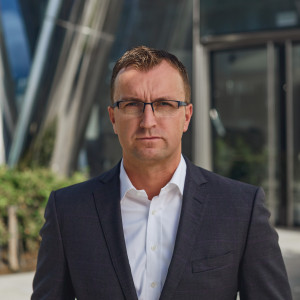
Robert Dobrzycki
Director General, Co-owner
Panattoni in Europe, the Middle East, and India
Robert Dobrzycki is the co-founder, co-owner, and CEO of Panattoni in Europe, the United Kingdom, the Middle East, and India. He graduated from the Faculty of Management at the University of Warsaw. In 2005, he founded Panattoni Europe which became a leader in the industrial real estate market and sustainable development in Poland and Europe. Under his leadership, Panattoni manages operations in 19 European markets, India, and from this year in Saudi Arabia and the Baltic countries. So far, Panattoni has completed over 22 million sqm of space in Europe, including over 15 million in Poland.
Robert Dobrzycki is involved in charitable activities, supporting Unicef Poland, PAH, and the Iskierka Foundation. In 2024, he launched his foundation, whose mission is the promotion of Poland and Polish entrepreneurship in the international arena. The foundation supports and promotes outstanding individuals in health, energy, economics, law, social activities, art, ESG, and sport. It has also established cooperation with the Museum of Modern Art in Warsaw.
Robert's passion is sport, particularly golf and football, as well as literature, evidenced by Panattoni's sponsorship of the NIKE Literary Award. Panattoni is also a strategic partner of Kozminski University.
Participates in the sessions:
-
Opening session. Challenges for the commercial property market: investment security, financing, and profitability of the property business
The world has changed. People have changed. The property business must change as well. How to prepare the prop-erty business for a new future and new geopolitical, economic, social, environmental, and technological challenges? A risk map: What is a matter of the utmost concern to the sector? Strategies for tough times. New opportunities. And this is what we will ask key investors, developers and experts about:
Investment security:
- The ongoing war in Ukraine across our eastern border affects investment decisions being made by property players – global corporations, manufacturing companies, or investment funds. Uncertainty among investors, who have adopted a wait-and-see strategy, is one of the most noticeable effects of Russian aggression in the property market. How has the investment attractiveness of Poland changed in the eyes of investors? Is the invested capital safe? The end of the war, stable law, predictable taxes, and investment incentives: What does it take for Poland to remain a magnet for new investments?
Debt is getting increasingly expensive:
- Banks are cautious about financing commercial property. Nowadays, it is more difficult to get a loan for an office building. Are hotels and shopping centres doomed? Warehouses are still the jewel in the crown, but there are requirements too. How is the policy pursued by institutions providing funding for property chang-ing? Will the high cost of money result in fewer new investments?
Property is (not) profitable. The profitability of the property business:
- Double-digit inflation, interest rate hikes, the rising costs of building materials and labour, and rising energy prices… How have recent events changed the profitability of property investments? Strong warehouses; battered hotels and shopping centres; office buildings waiting for the end of remote working, and flats chas-ing record after record: Which sectors are at their best today? What attracts investors’ attention?

